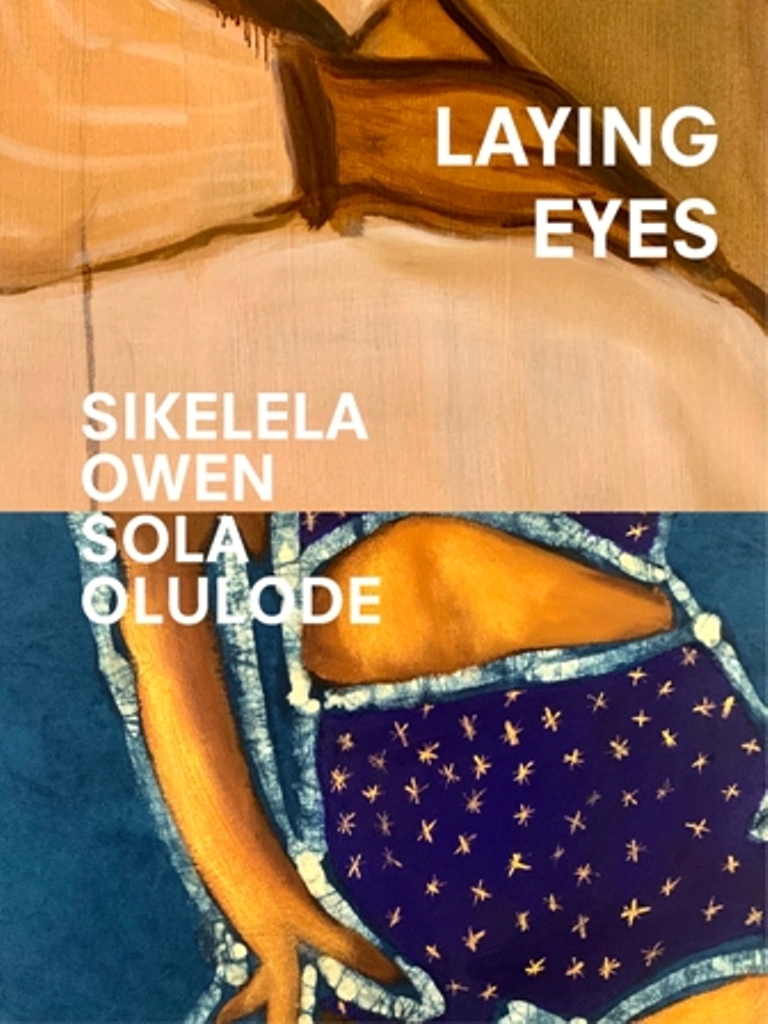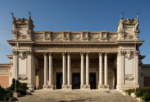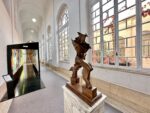Sikelela Owen & Sola Olulode – Laying Eyes

La galleria Alessandro Albanese, dopo un lungo e intenso percorso all’interno del distretto artistico di Via Ventura, nel quartiere di Lambrate, è lieta di presentare all’interno dei nuovi spazi espositivi di Via Cosimo del Fante 14, la mostra bipersonale delle artiste Sikelela Owen e Sola Olulode.
Comunicato stampa
La galleria Alessandro Albanese, dopo un lungo e intenso percorso all’interno del distretto artistico di Via Ventura, nel quartiere di Lambrate, è lieta di presentare all’interno dei nuovi spazi espositivi di Via Cosimo del Fante 14, la mostra bipersonale delle artiste Sikelela Owen e Sola Olulode, dal titolo “Laying Eyes”, con testi di Domenico de Chirico.
“Laying eyes” costituisce un atto di carattere duplice e vorticoso, materico e visivo al contempo, passivo e attivo, un gesto elastico che ritrae ed emana, inspira ed espira:
prendere gli occhi e adagiarli sognanti o posare gli occhi nel senso di guardare con anelo a qualcuno o qualcosa.
Ponendosi di fronte ai lavori di Sikelela Owen e Sola Olulode subito affiora questo senso circolare di beatitudine poiché entrambi inneggiano, attraverso espressività e gestualità differenti, all'umana complessità emotiva indagando a fondo relazioni e trepidazioni di persone a loro care la cui intimità viene tratteggiata, pennellata, resa in una veste cromatica unica e irripetibile.
Sikelela Owen, inglese classe 1984, (Chelsea College of Art and Design of London, 2006, Royal Academy School of London, 2012) dipinge il ricordo ritraendo nei suoi dipinti famiglia, amici e relazioni. Le sue immagini non equivalgono ad una mera rappresentazione di un momento nel tempo ma fanno i conti col tempo a cui hanno resistito. Rappresentano un'eco emotiva, data la forma visiva. Tale intangibilità è resa palese nella sua pennellata, da un lato espressiva e gestuale, ma anche adagiata in velature leggere come se sovrapponesse una foschia della memoria all'altra. Il dettaglio è solo ciò che è strettamente necessario: tutto ciò che è superfluo viene omesso o perduto. Pertanto, i risultati sono magnificenti dipinti che attingono sensibilmente alla perdita di un momento prezioso e a ciò che queste cose effimere possono generare dentro di noi.
I dipinti di Sola Olulode, nigeriano - britannica classe 1996, (University of Brighton, I Class of Honor, 2017, Lewisham Arthouse Graduate Studio Bursary, London, 2018) dei veri e propri corpi sociali e luoghi di unità e amicizia. Essi costituiscono un elogio della storia di identità nere, sfidando l'esclusività sociale e celebrando l'espressione individuale e collettiva. Nel loro contesto, canalizzano la vita notturna londinese nel presente creando tuttavia un “anti-spazio” che rimuove qualsiasi aggancio spaziale. Lo spazio onirico dei dipinti disimpegna le figure da un contesto definitivo. Consentendo al corpo di essere al centro della scena, dà risalto al movimento, al gesto e alla danza come forze vincolanti che riflettono l'esperienza personale e collettiva, l'individualità e la forza relazionale. Il corpo vibrante e liberato, quindi, non è vincolato a rigide formulazioni di identità che racchiudono e dividono il corpo sociale in membri distinti.
_______________________________________________________________
.
The Alessandro Albanese gallery, after a long and intense journey within the art district of Via Ventura, in the Lambrate area, is pleased to present the two-person exhibition of the artists Sikelela Owen and Sola Olulode in the new exhibition spaces of Via Cosimo del Fante 14 titled “Laying Eyes”, with texts by Domenico De Chirico.
"Laying eyes" constitutes an act of a double and swirling character, material and visual at the
same time, passive and active, an elastic gesture that retracts and emanates, inhales and exhales: take your eyes and lay them dreamily or lay your eyes in the sense of looking longingly at someone or something.
Facing the works of Sikelela Owen and Sola Olulode immediately emerges this circular sense of bliss as both praise, through different expressiveness and gestures, human emotional complexity by thoroughly investigating relationships and trepidations of people dear to them whose intimacy is outlined, brushstroke, rendered in a unique and unrepeatable chromatic guise.
Sikelela Owen, born in 1984, in London (Chelsea College of Art and Design of London, 2006, Royal Academy School of London, 2012) paints the memory of her by portraying family, friends and relationships in her paintings. The images of her are not equivalent to a mere representation of a moment in time but deal with the time they have resisted. They represent an emotional echo, given the visual form. This intangibility is made evident in her brushstroke, expressive and gestural on the one hand, but also laid down in light veils as if superimposing a haze of memory on the other. Detail is only what is strictly necessary: all that is superfluous is omitted or lost. Therefore, the results are magnificent paintings that sensibly tap into the loss of a precious moment and what these ephemeral things can generate within us.
The paintings by Sola Olulode, Nigerian - British born in 1996, (University of Brighton, I Class of Honor, 2017, Lewisham Arthouse Graduate Studio Bursary, London, 2018) of real social bodies and places of unity and friendship. They constitute a eulogy of the history of black identities, challenging social exclusivity and celebrating individual and collective expression. In their context, they channel London's nightlife into the present while creating an "anti-space" that removes any spatial link. The dreamlike space of the paintings disengages the figures from a definitive context. By allowing the body to take center stage, it emphasizes movement, gesture and dance as binding forces that reflect personal and collective experience, individuality and relational strength. The vibrant and liberated body, therefore, is not bound to rigid formulations of identity that enclose and divide the social body into distinct members.



